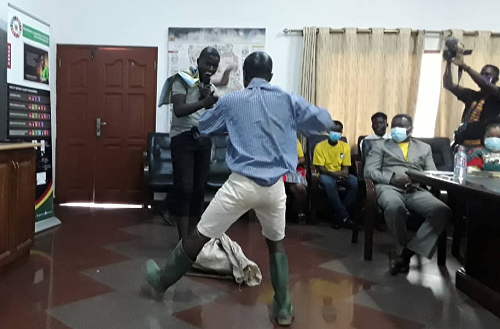
Dynamic Works NGO and Drama Troupe to use drama to promote agric in Ghana
As part of measures to promote agronomic education among farmers as well as create linkages between farmers and relevant stakeholders such as policy makers and consumers, the Dynamic Works NGO and Drama Troupe, has launched an initiative to use drama to bridge the gap.
Performing a drama titled: “To promote agric sector; the consumer must be considered” to launch the initiative last Tuesday, September 29, this year, in Accra, the Chief Executive Officer of the NGO, Mrs Gloria Cann, said the aim of the initiative was to help promote the country’s agricultural sector.
That, she explained, could be achieved if farmers adopted the right agronomic practices, a situation she noted could be attained when farmers understood the need for the concepts in simple language.
She expressed the worry that often times, many farmers find it difficult to grasp concepts that are given to them by extension officers due to lack of an appropriate communication tools, stressing that with the use of drama, such concepts could be broken down with a gist of laughter to make farmers appreciate those concepts.
Mrs Cann said many have tried to bridge the gap of communication between farmers, policy makers and consumers but little success have been achieved due to difficulties in creating a common platform that would enable the various value-chain stakeholders to understand each other.
She was of the view that, the drama, would go a long way to change the perception people have about the agricultural sector as well as creating the needed awareness about the importance of each stakeholders’ role.
She said apart from the NGO using the drama to bridge the communication gap between farmers, policy makers and consumers, the NGO also intended to use the drama to bring out the hidden talents in the youngsters who are used for the drama.
Themes in the drama
The drama, “to promote agric sector; the consumer must be considered,” tackled unhygienic practices that take place at the various market centres, how to increase productive by adopting good agronomic practices, the roles of the various agricultural value-chain players and the interdependence relationship between the various stakeholders in the agric sector.

A scene in the drama
The drama ended with a call on all stakeholders to play their roles in ensuring that Ghana achieves the Sustainable Development Goals two and three, which seek to “end hunger, achieve food security and improve nutrition and sustainable agriculture and ensure healthy lives and promote well-being for all ages respectively.”
Role of drama
In a speech read on his behalf, the Director of Crop Services at the Ministry of Food and Agriculture, Mr Seth Osei-Akoto, said “many research and development projects have failed due to lack of understanding or recognition of how the intended beneficiaries learn and communicate.”
That, he specifically mentioned, research and extension agencies have been at fault for not identifying and applying appropriate methods of passing on knowledge to farmers, stressing that the method of drama has proven to be an effective mode of communication.
According to him, the possible reason for the effectiveness of drama in communicating with farmers on certain concepts “is that drama is a systems approach to extension and, as such, it is able to combine complementary social, technical, and economic messages.”
For Mr Osei-Akoto, “Drama can be an effective method of both awareness raising and teaching about technical issues” and that it can reach a large number of people in a short time for reasonably low cost.
He was of the view that drama “Has the potential to spark discussion and innovation”, pointing out that “through drama, one is able to visually connect concepts together and to see how new technologies can fit into and, hopefully, improve agricultural communities.”
He noted that “The performing arts has the capacity to disseminate accurate, relevant and timely information to farmers in terms of what seed variety suits a given region, how to deal with pests and diseases, value addition to their products , proper storage and marketing of their produce.”
Mr Osei-Akoto consequently opined that “In the context of climate variability and change, drama can be used to address unpredictable weather patterns and promote various technologies that can be used by farmers to get appropriate information about proper agronomical practices.”
“Drama can be even more effective if the messages are created with greater participation of stakeholders, and if the tool is used in combination with other extension tools,” he noted, adding that “in countries where community drama groups are prevalent, drama as an agriculture extension tool is a viable option for research and extension agencies.”
